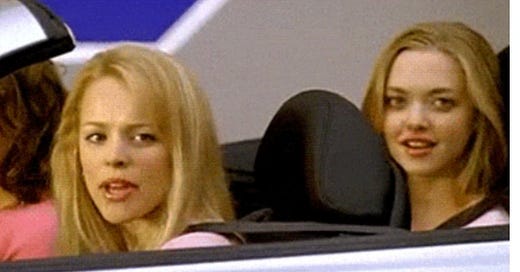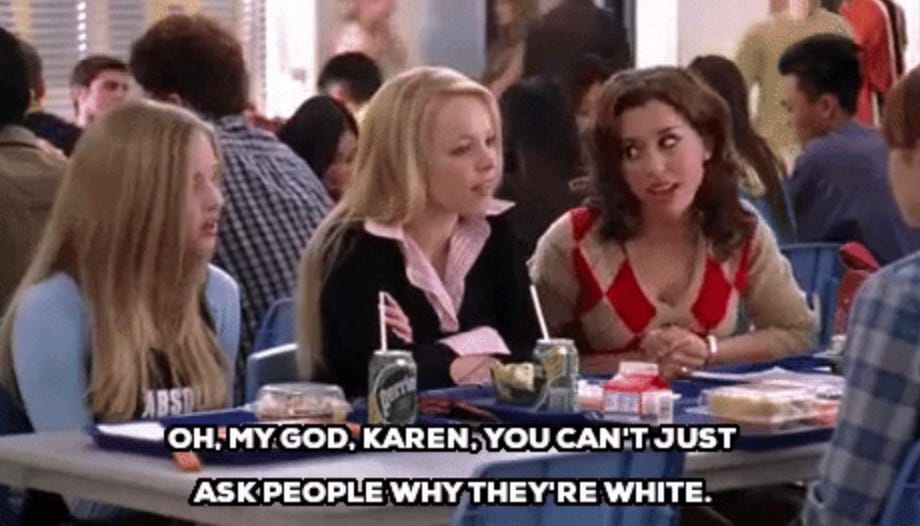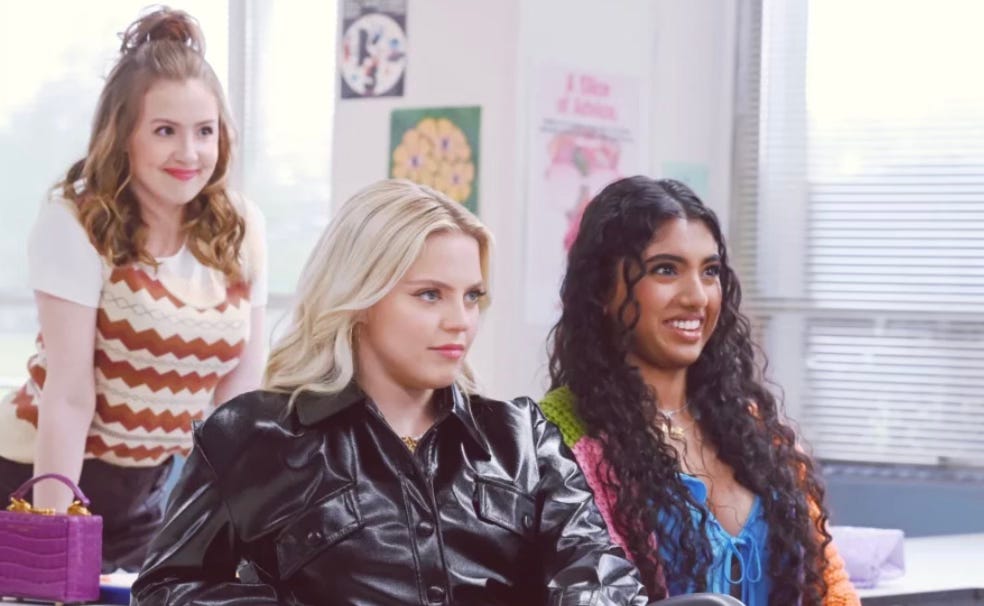Mean as in "I didn't mean to offend you"
White Pages Summer Movie Series: Mean Girls, a story in two parts
I have gotten to hear so many White liberal guilt stories these past couple months. This is a good thing, I promise. I mean, that’s a big part of why I wrote a memoir about my own White liberal guilt (why it was such a motivating force in my life, why letting it guide my politics and relationships did and didn’t get me and the world, what it might look like to care more about building community than merely appeasing my guilt, etc.). I hoped that it would inspire others to share their stories with me. And they do! Especially since I’ve been out on the road, doing book talks. I hear about White liberal guilt from raised hands during Q and As. I'm offered surprisingly vulnerable admissions in signing lines. I hang out in parking lots late at night, after the venue has closed, just to hear a few more new friends share “oh jeez, I saw more of myself in your book than I want to admit.”
I was in New York last week for the Literary Swag book club, a longstanding, multi-racial community of readers and writers facilitated by Yahdon Israel (my book’s editor). We sat in a circle in a hip Bowery clothing store and, as is that group’s tradition, drank apple juice (a thoughtful nod to inclusivity for members who keep sober in the often-wine-drenched world of literary events). And sure enough, I got to hear White guilt stories. A White educator talked about how, a couple Black history months ago, Black students at the school where she worked successfully convinced their angst-ridden White teachers that, for the duration of February, they should get to forego the seating chart and sit wherever they wanted. For reparations! A Black attendee responded with a story from a large music venue that recently hosted Burna Boy, the Nigerian pop star. As soon as the performer arrived, White staff apparently stepped over themselves trying to avoid calling him by his stage name before being reassured by Black colleagues that, in this case, the artist had chosen that name for himself and they wouldn’t be pilloried for saying “boy.”
Guilt is a tricky emotion, as it turns out. It situates ourselves in relation to others, which is a good thing. But it’s not really about other people, nor is it about causing less harm. It’s about our own ability to come out of the messy world of interpersonal relationships unscathed and unjudged.
You know what isn’t riddled with White guilt? The original Mean Girls, the 2004 teen comedy written by Tina Fey. Like quite a bit of Fey’s early aughts work (most notably 30 Rock, a television show whose occasional experiments in what can only be described as “Blackface, but make it… ironic?” were removed from streaming in 2020), the original Mean Girls has been criticized for the gap between how it considers gender vs. how it considers race (the former is a major animating concern, the latter is a punchline).
This won’t be a “Tina Fey is a classic toxic White feminist” essay, not because those critiques aren’t valid, but because they are already legion. Plus, I do think that there’s a bit of flattening smugness at play when White male writers try to jump on that particular bandwagon. In the same way that the term “Karen” has devolved from a form of radicalized social commentary into a “mean thing that conservatives get to call White ladies now,” it’s easy for writers like me to forget that, um, patriarchy is in fact bad and worth critiquing, regardless of the gender of the critiquer.
But yes, it’s true. There’s quite of bit of insensitive collateral damage in the original Mean Girls. A whole lot of that film’s politics (its consideration of fatness, disabilities, queerness, etc.) aren’t great, but many of its most worst offenses are racial. This is a Chicagoland-set film where at one point a Black administrator takes off his shirt, wields a bat at students and makes a quip about “why he left the Southside.” It’s also a film that repeatedly points out that a clique of Vietnamese girls (1). Are Vietnamese (2). Speak Vietnamese and (3). All have affairs with the same male faculty member. Get the joke? Asian women are hyper sexual and don’t speak English!
These jokes don’t exist in a vacuum, though. Growing up in the 1990s and 2000s, this particular school of humor (eventually dubbed “hipster racism”) was the lingua franca of well-educated, progressive White comedians who, depending on their age, grew up watching some combination of Richard Pryor, Eddie Murphy or Dave Chapelle crack jokes about racism before making the logical leap that, to prove their chops, they too should say whatever they damn well wanted about race. So many White comedians and writers sought to be, in essence, the Eminem of comedy— the crazy White boy or girl who would go there. Whereas previous generations of White comedians may have tossed off bigoted jokes in earnest, Gen X and Millennial comedic staples like The Simpsons, Family Guy, The Ali G Show and Anchorman deployed racist stereotypes and bigoted characters as implicit proof of their impressively arch sensibilities. Oh my God, that character said what? Surely it must be imbued with layers of intertextual meaning. We’re laughing together, right?
In recent years, when asked to reflect on the ironic racism of her past properties, Fey has used the common social justice language of “intent” versus “impact.” She cared about the former, didn’t consider the latter, and now she’s sorry. That’s a fair reflection, but it elides the point of what “was” the intent of all those *wink wink* racist jokes. I’ve read multiple mea culpa-ish Fey interviews from the past few years, but I haven’t been able to find any that ask the obvious follow-up. “But why do those jokes at all? What were you trying to accomplish?”
Speaking as an active consumer of those jokes, I can tell you exactly why I laughed at the racialized humor of the early aughts—be it Chapelle’s “Black Real World” or Fey’s “popular Asians.” The point was that I got it, that I had metabolized the lessons of anti-racism so effectively that, as a White guy versed in critical theory, my enjoyment of a certain flavor of comedy was in fact proof of my enlightenment. It’s a silly logic, but I wasn’t alone in falling into it. “Would an actual racist laugh at this racist joke? Not the way I’m laughing at it, they wouldn’t.”
What makes the original Mean Girls such a fascinating artifact is that unlike so many other “haven’t aged well” pop culture totems, it hasn’t been preserved in ember. Fey herself has rebooted it twice—first as a 2017 musical and now as a 2024 film based on that musical. And because the more recent Mean Girls aren’t sequels or retellings but literally the same story, written by the same author, but with more singing and social media references, they exist as windows in how the same progressive White people who once made “ironically” racist jokes now think about race in either (depending on which iteration we’re discussing) a post-Mike Brown, mid-Donald Trump or post-George Floyd America.
Taking Fey as our case study, what does the new Mean Girls say about progressive White America’s racial evolution? Well, the good news is that we’re not tossing off patently cruel barbs about young Asian women just to show how sophisticated we are! Progress! And we’ve definitely learned that we should have more prominent characters of color. Damion, the gay best friend? He’s Black now. And Karen, the dumb friend? She’s South Asian! You hear that? South Asian women can be Karens too! Literally! Now, do those very different ethnic identities in any way change those characters? Not at all! Nothing has changed about their arc, backstory or interiority. But you know what they aren’t? At least phenotypically? White.
And that’s what’s so fascinating about Mean Girls. There is aesthetic racial diversity everywhere, but where once that diversity was fodder for dumb “it’s not racist because I, the joke teller, am aware of racism” jokes, now race isn’t commented on at all. Characters talk about gender (a lot) and queerness (more so than in the first movie), which only calls greater relief the giant hole in the movie where an outward consideration of race and class might fit. Unlike its predecessor, the new Mean Girls very much is a White guilt movie, the product of a White woman creator who (thank goodness) no longer seeks to offend to prove her enlightenment, but now just wants to avoid getting in any trouble whatsoever.
Again, the reason why this is interesting is that, once again, Fey isn’t an outlier. I’d argue that, if you want to understand White progressivism four years after the summer of 2020, you could do far worse than watching the new Mean Girls.
If I were to diagnose (not as an outsider, but as an empathetic community member), the current vibe amongst White progressives, it would be something to the effect of: listen, for a while we did and said some things we regretted, and that was very sad and embarrassing (for us). And then, for an extremely heady summer, we tried to atone for all that and, well, that was cringey too. And also, we discovered that change wasn’t going to come about immediately. We didn’t stop caring, but the world opened up and we got busy in that pre-pandemic ways and before you know it there was October 7th and a war in Gaza and more reminders, for us American White progressives, that we did care about the world outside our doors but we also desperately didn’t want to get in trouble for saying the wrong thing. So now? It'd be way easier just not to talk about race whatsoever, particularly domestically. Don’t worry, we’ll make sure the things we create, the teams we hire, the stories we elevate look more diverse, but please don’t make us do anything embarrassing or risky.
There’s a reactionary version of this essay about how “cancel culture killed comedy,” about how the unseen panopticon of social justice warriors have denied Tina Fey her God given right to be cruel towards young Asian women. But the loss here isn’t that comedians can’t make hack jokes any more (for the record, they can, and they do! Don’t you worry your pretty head, Mr. Seinfeld!). Again, returning back to the text of Mean Girls, that canvas offers such a rich consideration of race and class.
I mean, you all! Mean Girls is a story about a White teen girl raised in post-colonial Africa [notably, in the new movie, Fey, who is not going to make the same mistakes again (but who also won’t be saying anything interesting about the past mistake), identifies the actual country of origin— Cady is from Kenya now, I guess!]. After an entire life as an ex-pat, our heroine is suddenly transplanted to a very specific type of American high school (an Evanstonian suburb that is more racially diverse than most American communities but, in the real world, would be shaped by intense and, let’s be honest, imminently mockable race-and-class-based hierarchies). There’s race in that story! And of course that racialized story intersects with gender, adolescent cliqueiness, social media narcissism and the immense weight borne by young women in America. All of that’s very interesting! And worth commenting on! And maybe one White Gen X writer isn’t equipped to unlock the full knottiness of it, but also movies don’t have to be written by one person, as it turns out.
When every iteration of Mean Girls considers issues of gender and patriarchy, you can tell that its animated not just by Fey’s desire to show off what kind of good liberal she is, but by a broader empathetic social project. The best parts of both films are imbued with Fey’s implicit hope that, by poking fun at the way patriarchy is internalized by teens, she can help point to a better world for young women. When I watch the new Mean Girls from a racial lens, I’m not triggered by its unwokeness. I’m just sad about the opportunity cost. It doesn’t even try to consider race, which is another way of saying that it doesn’t care about a more just racial future, as long as its creator doesn’t get in trouble again.
Again, this isn’t a Tina Fey problem. It’s an arc of the moral universe problem. Because to be honest, I do believe that arc can bend towards justice, but never passively, and definitely not without friction and reaction. When it comes to people propped up by current systems— men by patriarchy, White people by White supremacy, straight cis people by heterosexism— I know firsthand all the ways that we can twist that arc back in the wrong direction. Sometimes we yell and shout. Some times we make dumb jokes. Most times, tragically, we just decide that caring is too embarrassing, too cringey, not worth the risk if anybody might point out that we’re not doing it right. And what a waste. Not just for social change efforts, but for the quality of all of our relationships. We have so much to give each other, if only we actually cared more about one another than we feared messing up.
We are still in “So many end notes” season, friends!
I made it through the whole piece without shoehorning a “make fetch happen” reference. Please clap.
I’m proud to participate in this “Substackers for Palestine Children’s Relief” fundraiser organized by . Please consider joining me in contributing to the Palestinian Children’s Relief Fund! As agnostic I am about the noun “Substacker” (lol), it’s very cool when newsletter writers and readers realize our potential collective impact. It looks like this effort, for instance, is absolutely blowing through its fundraising goals! Cool!
That book I mentioned? The one I wrote? It’s still very purchasable (and I’d love if you would consider getting a copy, as I continue to try to do this work (reaching out to other often-prone-to-giving-up White people and saying, “hey, let’s not quit”).
I will write a full piece about the book tour, because it’s been one of the most powerful professional experiences of my life. It’s introduced me to so many of you and the places that matter to you (and, importantly, your beautiful efforts to make those communities better!). Every single stop I’ve been like “that’s the most profound, powerful experience I’ve had on tour so far.” But for now, a few notes:
The spring run ends tonight, in Oakland (unless you count the DJ gig I have a couple weeks from now— it’s for my nieces’ Bat Mitzvah in Philly and now that I think of it you should definitely consider that part of book tour, but I digress). I’m writing this from ’s apartment. She and are hosting me tonight at Temescal Commons (480 42nd Street, Oakland, near the Macarthur BART). It’s looking like it’ll be a VERY FUN CROWD. Come through (and RSVP)!
Well… it mostly ends tonight, since this next event is virtual but also very cool. Residents of Washington State! Or people who care about residents of Washington State! Did you know that there is a grassroots campaign to get y’all actual universal healthcare? It’s true. It’s called WHOLE WASHINGTON and I’m leading a public, virtual organizing training for them on June 19TH at 6:00 PM PT. RSVP here.
I am currently deep in scheming mode (re: events for fall and winter). Are you part of a community that is trying to do good work and wouldn’t mind an excuse to get together and talk about it? I’d love to come your way. I’m a cheap date, especially if where you live isn’t too hard for me to get to. Holler at me and let’s brainstorm together (garrett@barnraisersproject.org).
Is this issue part of the White Pages Summer Movie Series? You better believe it! Keep posted, because the whole line-up is going to be great (I’m also excited for the guest authors we already have lined up). Here’s the whole list of movies on the docket. I still might have some guest spots available (I pay) so if you want to pitch, it never hurts. garrett@barnraisersproject.org.
You know, I considered many songs of the week for this issue (I mean, the 2024 Mean Girls is literally a musical, and goodness knows there are no paucity of songs about teen angst in the Western musical canon. Maybe I’m overwhelmed by choice this week! That’s to say, feel free to nominate songs of the week in the comments. In the meantime, it’s been a while since I’ve included the link to the songs of the week playlist (which I need to update! I’ll get to it, truly! Blame tour!). You can check it out on both Apple Music and Spotify.







LOL I chose “Substacker” and then later was like “oh god, why didn’t I just say Substack Writers,” so I’m with you
So good!